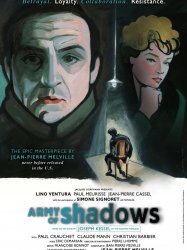Films with theme "Histoire de France", sorted by revenue

The Affair of the Necklace (2002)
, 1h58Directed by Charles Shyer
Origin USA
Genres Drama, Historical, Romance
Themes Politique, Marie-Antoinette, Political films, Escroquerie, Histoire de France, French Revolution films, Films about royalty
Actors Hilary Swank, Jonathan Pryce, Simon Baker, Adrien Brody, Joely Richardson, Christopher Walken
Jeanne de Saint-Rémy de Valois, orphaned at an early age, is determined to reclaim her royal title and the home taken from her family when she was a child. When she is rebuffed by Marie Antoinette and fails to achieve her goal through legal channels, she joins forces with the arrogant, well-connected gigolo Rétaux de Villette and her own wayward, womanizing husband Nicholas. They concoct a plan to earn her enough money to purchase the property.

Lost Command (1966)
, 2h9Directed by Mark Robson
Origin France
Genres Drama, War, Action, Historical
Themes Films set in Africa, French war films, La colonisation française, Films about terrorism, Algerian War films, Political films, Histoire de France
Actors Anthony Quinn, Alain Delon, George Segal, Michèle Morgan, Claudia Cardinale, Maurice Ronet
In the final moments of the 1954 Battle of Dien Bien Phu, a weakened French garrison anticipates a last assault by communist Viet Minh troops.

Army of Crime (2009)
, 2h19Directed by Robert Guédiguian
Origin France
Genres Drama, War, Historical
Themes French war films, Political films, Histoire de France, L'Occupation allemande en France, La condition juive en France sous l'Occupation allemande
Actors Virginie Ledoyen, Simon Abkarian, Robinson Stévenin, Grégoire Leprince-Ringuet, Lola Naymark, Jean-Pierre Darroussin
In Paris during the German occupation, an ill-assorted group of resistance fighters commits disorganized attacks. Missak Manouchian, an Armenian exile, is ready to help but is reluctant to kill; for him, being ready to die but not to kill is an ethical matter. However, circumstances lead him to abandon his reluctance. Under his leadership, the group structures and plans its actions and thus the Manouchian network is born. The film traces the story of this group, from its shaping to the execution of its members in 1944.

Orphans of the Storm (1921)
, 2h30Directed by D. W. Griffith
Origin USA
Genres Drama, Historical, Romance
Themes Films about children, Medical-themed films, Théâtre, Films about disabilities, Political films, Films about capital punishment, Films based on plays, La cécité, Histoire de France, French Revolution films
Actors Lillian Gish, Dorothy Gish, Joseph Schildkraut, Lucille La Verne, Frank Losee, Frank Puglia
Just before the French Revolution, Henriette takes her close adopted sister Louise to Paris in the hope of finding a cure for her blindness. She promises Louise that she will not marry until Louise can look upon her husband to approve him. Lustful aristocrat de Praille (whose carriage kills a child, enraging peasant father, Forget-not) meets the two outside Paris. Taken by the virginal Henriette's beauty, he has her abducted and brought to his estate where a lavish party is being held, leaving Louise helpless in the big city. An honorable aristocrat, the Chevalier de Vaudrey helps Henriette to escape de Praille and his guests by successfully fighting a duel with him. The scoundrel Mother Frochard, seeing an opportunity to make money, tricks Louise into her underground house to be kept prisoner. Unable to find Louise with the help of the Chevalier, Henriette rents a room, but before leaving her de Vaudrey comforts and kisses the distressed woman. Later, Henriette gives shelter to admirable politician Danton, who after an attack by Royalist spies following a public speech falls for her. As a result, she runs foul of the radical revolutionary Robespierre, a friend of Danton.

The Battle of Algiers (1966)
, 2h1Directed by Gillo Pontecorvo
Origin Algerie
Genres Drama, War, Documentary, Historical
Themes Films set in Africa, French war films, La colonisation française, Films about religion, Films about terrorism, Algerian War films, Political films, Films about Islam, Histoire de France
Actors Jean Martin, Brahim Haggiag, Rouiched, Larbi Zekkal
En 1954 à Alger, le Front de libération nationale (FLN) diffuse son premier communiqué : son but est l'indépendance nationale vis-à-vis de la France, et la restauration de l'État algérien. Ali la Pointe propose des parties de bonneteau. Repéré par la police, il s'enfuit mais se fait agresser par un passant, il réplique et se fait tabasser par le reste du groupe. Rattrapé par la police, il se fait arrêter. Emprisonné, il assiste par la fenêtre de sa cellule à l'exécution d'une peine de mort par guillotine sur un nationaliste. Le FLN le contacte.

Army of Shadows (1969)
, 2h19Directed by Jean-Pierre Melville, Jean-François Adam
Origin France
Genres Drama, War, Thriller, Historical
Themes French war films, La provence, Films about religion, Political films, Films about Jews and Judaism, Histoire de France, L'Occupation allemande en France
Actors Lino Ventura, Simone Signoret, Paul Meurisse, Jean-Pierre Cassel, Serge Reggiani, Christian Barbier
Philippe Gerbier (Lino Ventura), the head of a Resistance network, is arrested by Vichy French police, imprisoned in a camp, and transported to Paris for questioning. He makes a daring escape.

Far from Men (2015)
, 1h50Directed by David Oelhoffen
Origin France
Genres Drama, War, Western
Themes Films set in Africa, French war films, La colonisation française, Films about terrorism, Algerian War films, Political films, Histoire de France
Actors Viggo Mortensen, Reda Kateb, Nicolas Giraud, Yann Goven, Ángela Molina
En 1954, au début de la guerre d'Algérie, deux hommes, que tout oppose, sont contraints de fuir à travers les crêtes de l’Atlas saharien d'Algérie. Au cœur d’un hiver glacial, Daru, instituteur reclus, doit escorter Mohamed, un paysan accusé du meurtre de son cousin. Poursuivis par des villageois réclamant la loi du sang et par des colons revanchards, les deux hommes se révoltent. Ensemble, ils vont lutter pour retrouver leur liberté.

Wild Reeds (1994)
, 1h50Directed by André Téchiné
Origin France
Genres Drama, Comedy-drama, Romance
Themes L'adolescence, French war films, La colonisation française, Films about children, Films about sexuality, LGBT-related films, Algerian War films, Teen LGBT-related films, LGBT-related films, Coming out, Histoire de France, LGBT-related film
Actors Élodie Bouchez, Gaël Morel, Stéphane Rideau, Frédéric Gorny, Michèle Moretti, Jacques Nolot
The film is set in southwest France in 1962. François (Gaël Morel), a shy young man from the lower middle class, is working towards his high school diploma. He spends most of his time talking about movies and literature with his best friend, Maïté (Élodie Bouchez), whose mother Mme Alvarez (Michèle Moretti) is François's French teacher. Mme Alvarez and Maïté are communists. At the boarding school, François becomes acquainted with the sensual son of a farmer, Serge (Stéphane Rideau). At night, he joins François in the dormitory to chat. Finally, Serge draws François into an erotic relationship.

Charlotte Gray (2002)
, 2h1Directed by Gillian Armstrong
Origin United-kingdom
Genres Drama, War, Historical, Romance
Themes Political films, Histoire de France, L'Occupation allemande en France
Actors Cate Blanchett, Michael Gambon, James Fleet, Billy Crudup, Abigail Cruttenden, Rupert Penry-Jones
In 1942, a young Scot, Charlotte Gray, travels to London to take a job in a surgery. On the train, a man enters her compartment and chats with her, asking questions about her life and expressing interest that she is fluent in French. He gives her his card with the date, time and address of a book launch. Social life in London is in full swing and her friends convince her to go. She soon meets RAF Flight Lieutenant Peter Gregory, but is interrupted by Richard Cannerley, the older man from the train, who urges her to meet some of his acquaintances and asks her to contact him when she leaves.

Reign of Terror (1949)
, 1h29Directed by Anthony Mann
Origin USA
Genres Drama, Thriller, Adventure, Historical
Themes Political films, Histoire de France, French Revolution films
Actors Robert Cummings, Richard Basehart, Arlene Dahl, Richard Hart, Arnold Moss, Norman Lloyd
Already the most powerful man in France, Maximilien Robespierre (Richard Basehart) wants to become the nation's dictator. He summons François Barras (Richard Hart), the only man who can nominate him before the National Convention. Barras refuses to do so and goes into hiding.

I Accuse! (1958)
, 1h32Directed by José Ferrer
Origin United-kingdom
Genres Drama, Biography, Historical
Themes Spy films, Films about racism, Films about religion, Films about Jews and Judaism, Histoire de France
Actors Anton Walbrook, José Ferrer, Viveca Lindfors, Leo Genn, Emlyn Williams, David Farrar
Accusé à tort d'espionnage, le capitaine Alfred Dreyfus fut dégradé et condamné à la déportation à vie.

Joan the Woman (1916)
, 2h18Directed by Cecil B. DeMille
Origin USA
Genres Drama, Adventure, Historical
Themes Films about religion, Jeanne d'Arc, Political films, Histoire de France
Actors Geraldine Farrar, Raymond Hatton, Hobart Bosworth, Theodore Roberts, Wallace Reid, Charles Clary
A British officer (Bosworth) in World War I has a dream of the life of Joan of Arc (Farrar). The officer pulls a sword out of the wall of the trench he is in, the sword used to belong to Joan of Arc. Removing the sword conjures up the ghost of Joan, leading to her telling her story. The setting then changes to France where the story of Joan of Arc is told, of her leading the French troops to victory and her subsequent burning at the stake. The story ends back in the trench with the officer deciding to go on a suicide mission, using Joan's story and sword as inspiration

Lucie Aubrac (1997)
, 1h55Directed by Claude Berri, Frédéric Auburtin
Origin France
Genres Drama, Biography
Themes French war films, Political films, Histoire de France, L'Occupation allemande en France
Actors Carole Bouquet, Daniel Auteuil, Patrice Chéreau, Jean-Roger Milo, Bernard Verley, Heino Ferch
Ce film retrace l'histoire de la vie de Lucie Aubrac pendant la résistance à l'occupation nazie, dont un "coup d'éclat" réussi... l'organisation d'un commando pour faire évader son mari Raymond Aubrac.

Resistance (2020)
Directed by Jonathan Jakubowicz
Origin France
Genres Drama, War, Biography, Comedy, Comedy-drama, Documentary, Historical
Themes Histoire de France, L'Occupation allemande en France, La condition juive en France sous l'Occupation allemande
Actors Jesse Eisenberg, Ed Harris, Édgar Ramírez, Clémence Poésy, Matthias Schweighöfer, Bella Ramsey
Durant la Seconde Guerre mondiale, en 1942, Marcel Mangel s'engage, sous le nom de Marcel Marceau, dans la Résistance française, sous l'influence de son frère Simon et de son cousin, Georges Loinger. En partie par le mime, il aidera de nombreux enfants orphelins, dont les parents ont été tués par les nazis.

Saint Joan (1957)
, 1h50Directed by Otto Preminger
Origin USA
Genres Drama, Historical
Themes Films about religion, Théâtre, Jeanne d'Arc, Political films, Films based on plays, Histoire de France, Films about royalty
Actors Jean Seberg, Richard Widmark, Richard Todd, Barry Jones, Anton Walbrook, John Gielgud
In 1456, Charles VII (Richard Widmark), experiences dreams in which he is visited by Joan of Arc (Jean Seberg), the former commander of his army, burned at the stake as a heretic twenty-five years earlier. In the dream he tells Joan that her case was retried and her sentence annulled. He recalls how she entered his life as a simple, seventeen-year-old peasant girl; how she heard the voices of Saints Catherine and Margaret telling her that she would lead the French army against the English at the siege of Orléans and be responsible for having the Dauphin crowned king at Rheims cathedral. When Joan arrives at the Dauphin's palace at Chinon she discovers that he is a childish weakling with no interest in fighting. After being tested by the members of the court, who conclude that she is mad, Joan imbues the Dauphin with her belief and fervor and he gives her command of the army.
 Connection
Connection